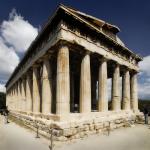|
This section contains 206 words (approx. 1 page at 300 words per page) |

|
Pastures. Ruled by its aristocratic families, Thessaly was a land of great fertility. It had large tracts of productive farmland, which yielded a surplus of wheat that the Thessalians exported to their neighbors. Its pasturelands ensured that Thessaly had the best cavalry in Greece. Below the aristocratic families there was a large class of citizens rich enough to keep horses; this class provided the cavalry, which was the backbone of the military force. At the bottom of the ladder stood a class of people called penestai, who like the helots in Sparta were a subjected people neither free nor fully slaves, but somewhere in between. No "middle class" comparable to that in Athens existed in Thessaly.
Forests. In the late Archaic (700-480 B.C.E.) and early Classical (480-323 B.C.E.) eras, Thessaly apparently still possessed large tracts of forests...
|
This section contains 206 words (approx. 1 page at 300 words per page) |

|




